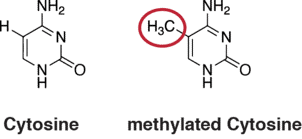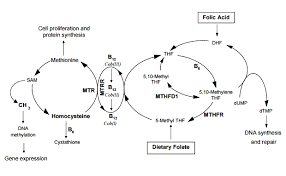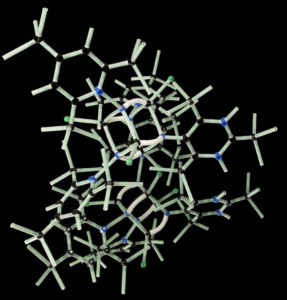 Excuse the WTF expletive but if you’re like me, you probably find discussions on methylation and MTHFR get pretty high-ceilinged, pretty quickly!
Excuse the WTF expletive but if you’re like me, you probably find discussions on methylation and MTHFR get pretty high-ceilinged, pretty quickly!
Meaning, it takes a lot of concentration to wade through the biochemistry and work out what the heck people are talking about and to ascertain what’s actually important with respect to your individual health.
You also wouldn’t be the first person to read about MTHFR or any other gene variation for that matter, and think,
“Oh no – that’s me!”
To panic and then not know what to do from there.
So, with a series of blogs, I’ve tried to put a few things in perspective. An important blog to start with is Should I be Freaking Out About my Genes? where I discuss that not all facets of gene variations are bad. There are beneficial attributes to all gene variations. I also discuss Dr. Ben Lynch’s book Dirty Genes where he outlines that there are two types of genes:
1. Genes That Are “Born Dirty”
2. Genes That Just “Act Dirty”
Make sure you have a read.
Back to WHY gene variations even matter but first we need to discuss methylation.
What is Methylation?
Methylation has quickly become the latest “buzz” word but what does it mean for you and how can it impact your health?
Methylation processes are absolutely central to our physical, emotional and mental wellbeing. Methylation is a biochemical process involved in almost all of our body’s functions and check this out –
it is estimated that over 1 million methylation processes occur in every cell, every second, in the body.
Who knew!?!?
 Now without getting too technical, methylation is the addition of a single carbon and three hydrogen atoms (called a methyl group) to another molecule. While the removal of a methyl group is called demethylation.
Now without getting too technical, methylation is the addition of a single carbon and three hydrogen atoms (called a methyl group) to another molecule. While the removal of a methyl group is called demethylation.
Stay with me now.
These steps are essential for the optimal function of almost all of our body systems.
Think of billions of little on/off switches inside your body that control everything from your stress response and how your body makes energy from food, to your brain chemistry and detoxification pathways.
That’s methylation and demethylation. Life would simply not exist without it.
Methyl groups:
- Provide us with energy
- Turn the stress (fight-or-flight) response on or off
- Control the production of and recycling of glutathione — the body’s master antioxidant
- Co-ordinate the detoxification of fats, chemicals, and heavy metals
- Process hormones
- Create the inflammatory response
- Reduce histamine
- Repair of cells damaged by free radicals
- Repair cell membranes
- Repair DNA and RNA
- Turns genes on and off
- Builds immune cells
- Coordinate the immune response, (controlling T-cell production, fighting infections, and viruses and regulating the immune response)
- Co-ordinate the myelination of nerves
- Coordinates neurotransmitters and the balancing of brain chemistry to prevent depression, anxiety, and insomnia
Methylation also allows the body to make a number of other important molecules, including:
- Melatonin, which helps with sleep
- Serotonin, which regulates mood, appetite and more
- Norepinephrine, which is involved in arousal and motivation
- Glutathione, often called the body’s “master antioxidant” that fights free radicals
- Coenzyme Q10, an antioxidant involved in energy production and healthy aging
- Nitric oxide, which facilitates vacillation of blood vessels and circulation
- L-carnitine, an amino acid that supports metabolic processes and cellular energy
- Cysteine, an amino acid that helps make protein and form collagen in the body
- Creatine, needed for skeletal and muscle function
- Taurine, an amino acid that supports the heart, nerves and brain
So, yes as far as processes in the body go –methylation is definitely more than “kind of a big deal since methylation governs everything – even our genes!
So why haven’t we heard about Methylation before?
Good question!
That’s the crazy thing. Methylation, gene variations, and the field of epigenetics have really only become commonplace discussion points within the last 10-20 years.
Why now?
Because we are only just starting to appreciate how so many of the health challenges and diseases that we are facing in our modern world relate back to how we are triggering our genes. How the cumulative effect lifestyle decisions can have not only on our genes and therefore our health, but on the health of our children and grandchildren. This means that our current health picture has been potentially influenced by the chemical and toxin exposure both our parents and grandparents faced, their nutrition and their mental health.
The exciting part is that – at one time, we thought that our genes were our destiny. We believed genes couldn’t be changed, altered, or modified however, our genetic makeup is no longer thought of as something that defines our destiny. Unless we have a rare genetic marker for one of the few diseases known to be caused by a defective gene, the way we live our life influences our fate more than your genes.
That means the ball is back in our court!
Back to methylation.
Improving methylation is important for everyone.
The methylation cycle is important because it takes the nutrients from our food (and supplements) to make the energy our bodies need to work properly. I often refer to it as the “B vitamin Cycle” because this is where the B vitamins (B1, B2, B3, B6, B9, B12) get used in our bodies and why B vitamins are so important for our health.
Once through the methylation (B vitamin) cycle, our bodies use methyl-groups to make healthy cells and neurotransmitters (for mood), as well as for removing toxins (in the liver), fighting infections and protecting us from oxidative stress. That’s why we often hear about how important B vitamins are to feeling well and for recovering from stress. When you are stressed, your methylation cycle has more work to do and needs more B vitamins to get that work done.
It is quite amazing when you think about it that the processes involved can have such a significant influence throughout your body. When methylation is working, you’re more likely to feel full of energy, in a good mood; you will feel generally well. When it is not working, you will feel tired, depressed, irritable, run-down, susceptible to infections, foggy-brained, and just plain “toxic.”
One reason is that methylation controls the production and recycling of glutathione, the body’s master antioxidant, and master “splinter” remover. Glutathione is one of the most important natural detoxification agents in our body. It contains sulfur groups, which are sticky compounds that adhere to toxins and heavy metals and carry them out of the body. This is a good thing for all of us health-wise. Particularly when you are preparing for a baby.
Glutathione directly neutralizes free radicals, reduces inflammation and assists in the role of other antioxidants like vitamin C, E, and lipoic acid. In a perfect world, our body makes its own glutathione from the amino acid’s cysteine, glycine, and glutamine via the methylation cycles and glutathione is recycled using methyl donors like vitamin B12, folate, betaine, and other nutrients. That’s how clever our body is and how important methylation is for detoxification processes to occur properly.
Have a read of our blogs on Glutathione here and learn what habits and activities that deplete your body of glutathione.
By now you might be wondering what happens when this methylation process goes wrong or gets derailed?
This is where MTHFR and variations of this gene and others, come into play. You may have heard of the term SNP? A SNP (pronounced “snip”), short for single-nucleotide polymorphism which is the most common type of genetic variation among people. These gene variations—and each of us apparently have several—can do a full-scale number on our body and our brain. These SNPs can influence whether you’re heavy or slim, sluggish or energized, depressed or optimistic, anxious or calm.
Let’s dive a bit deeper.
Understanding the Methylation Cycle
 Understanding the methylation cycle starts with thinking of dominos lined up. Just like when the dominos start to fall—and each domino topples onto the next—when enzymes that trigger methylation start processing nutrients, one enzyme affects the next.
Understanding the methylation cycle starts with thinking of dominos lined up. Just like when the dominos start to fall—and each domino topples onto the next—when enzymes that trigger methylation start processing nutrients, one enzyme affects the next.
And just like with dominos, if one domino is out of line and doesn’t topple onto the next one the process stops working, it causes a backup that inhibits the enzymes that follow and this, in turn, affects how we feel and how well we function.
Research shows that decreased function of the enzymes in the methylation cycle can affect our health and increase our risk of heart disease, cancer, chronic fatigue, mood disorders, diabetes, and aging in general.
Methylation is also important for mitochondrial function and energy production. Low mitochondrial function and low methylation can lead to low energy, low thyroid function, and decreased memory.
Methylation also affects our immune function, including the likelihood that we’ll experience allergies this spring. Methylation affects the ability of our body to make new healthy cells to heal and repair and ultimately fertility, including the risk of miscarriage.
The Key Enzymes and Steps in the Methylation Domino Cycle.
Let’s briefly look at the enzymes involved with methylation. Why would we do something as painful as that you ask? (Hehehehe)
- If you have concerns that your methylation cycle is not efficient.
- If you’ve had your homocysteine levels checked or your DNA tested and you have MTHFR SNP’s
then we need to understand some key bullet points so that we can tune in to how our body responds to the changes we implement. If you look up the methylation cycle you’ll see incredibly complicated charts that with daunting and confusing. Practitioners will also throw all sorts of foreign words at you and it’s best if we have some awareness on methylation basics, so that we can be somewhat informed and build our knowledge from there. The good news is you can always return to blogs like these or podcasts and refresh your memory because let me reiterate, this is a big topic and once you dive in you realise some of it gets quite detailed.
My goal is that you don’t just think “Okay I have a methylation issue, I’ll just take a supplement from here on in. Problem solved.”
 That’s not the outcome I want for you.
That’s not the outcome I want for you.
Nor unfortunately would the problem solved.
Supplements are great initially when you’re inflamed, you’re anxious or battling in some way, they are not however something to take blindly ‘forever.’ Some experts in fact suggest long-term constant, unmonitored use – is not advantageous and are potentially harmful. Make sure you have a read of our How Can I Improve Methylation? blog.
So back to the methylation steps.
The following steps help to outline the methylation cycle (which honestly has done my head in for many years) but when spaced out – it’s easier to understand than the crazy methylation charts and how enzymes influence each other and our health.
Enzymes are given nicknames based on the first letter of each of the chemical words in their name.
The methylation process starts with the MTHFR enzyme. It is responsible for the proper activation and utilisation of folate (vitamin B9) or synthetic folic acid that we derive from supplements or fortified food. (FYI folic acid is not the same, more on this later) When we eat foods that contain folate (vitamin B9), MTHFR converts it into methyl-folate, folate’s active form. Folate is known as a methyl donor.
This process is super important because methyl-folate plays a role in just about everything our body does and this conversion – is Step One of the methylation process.
 Research indicates that at least 60% of people have an MTHFR variation and they consequently have a decreased ability for folate conversion (the process doesn’t completely stop; it merely decreases by 40 to 80%).
Research indicates that at least 60% of people have an MTHFR variation and they consequently have a decreased ability for folate conversion (the process doesn’t completely stop; it merely decreases by 40 to 80%).
If you have an MTHFR variation, your body is less able to use synthetic folic acid or folate, in the methylation cycle, which means you won’t get the benefit of the B vitamin cycle working optimally, and that can increase your risk for many of the health conditions outlined above. This does NOT mean we need to rush out and supplement with folic acid –we’ll discuss the downsides of folic acid later. Luckily, we can help our dirty, sluggish or inefficient MTHFR genes by taking high quality activated B supplements and by eating foods that already contain a lot of methyl folate, easing its burden and supporting your cycle. Leafy green are full of methyl folate. More on this in our How Can I Improve Methylation? blog.
 Let’s continue as it is NOT just about methyl-folate.
Let’s continue as it is NOT just about methyl-folate.
The next steps in the methylation cycle need to be addressed as well. Methyl-folate connects with the next ‘dominos’ in the chain–MTRR, MTR, MAT, BHMT, and finally CBS.
MTRR creates methylcobalamin (a form of vitamin B12) and then MTR uses that methylcobalamin, together with methyl-folate (the methyl-folate we just spoke about), to turn a substance called homocysteine into another enzyme, called methionine.
Methionine, is essential for cell growth and DNA metabolism. Methionine is also used by our body to make proteins, utilize antioxidants and assist our liver to process fats. We like methionine!
MAT then uses methionine to make yet another crucial substance called SAM or S-Adenosyl Methionine.
BHMT is a “shortcut” through the middle of the methylation cycle that allows your body to use choline (such as from eggs, shrimp, poultry, salmon, and leafy greens) instead of folate and B12 to make methionine, which is (again) turned into SAM by MAT.
SAM, the end result of this particular domino line, creates a much-needed methyl group which is then passed on to other pathways that protect your DNA and cells and make your neurotransmitters and other important pathways, including energy-production pathways in your mitochondria. A deficiency of methionine leads to reduced levels of SAM-e resulting in mitochondrial issues and an increased risk of depression. SAM-E is also a universal methyl donor for almost 100 different substrates, including DNA, RNA, hormones, proteins, and lipids. So many good things come from the methylation cycle!
In the end, SAM-E turns back into homocysteine so it is ready to go around the cycle again (unlike dominos, in our bodies, the process is continuous). Homocysteine always gets a bad wrap but it plays an important role in our metabolism. You need a healthy metabolism to have enough energy. Homocysteine is associated with certain health problems, but is it really necessarily an evil amino acid? The answer seems to be somewhere in the middle. If you have low levels of homocysteine, you could be at risk for certain nerve issues. But if you have too much, you can develop problems as well. It appears that there’s a “sweet spot,” so to speak, where your body can benefit from homocysteine without suffering negative side effects. That’s why measuring homocysteine in your blood can be so useful for knowing how well your methylation cycle is working (after you understand your SNP’s.)
The final enzyme in this process is called CBS; this acts as the methylation cycle’s built-in ‘drain’ by removing homocysteine and using it to process ammonia and make glutathione. YIPPEE!
Again, glutathione is our most important anti-oxidant, so SNPs on CBS can make for increased OXIDATIVE STRESS and higher ammonia levels, leading to fatigue and achiness. SNPs on CBC can also affect sulfur levels in your body, which is why some practitioners recommend checking your urine sulfur before starting to address methylation.
When the methylation switch is turned off and isn’t creating enough SAMe, then a number of important molecules cannot be efficiently produced, including:
- Glutathione
- Coenzyme Q10
- Melatonin
- Serotonin
- Nitric Oxide
- Norepinephrine
- Epinephrine
- L-Carnitine
- Cysteine
- Taurine
The short version
1) MTHFR
Stands for Methylenetetrahydrofolate reductase. It converts folic acid or folate, to methyl-folate (5MTHF or B9) using riboflavin (B2).
2) MTRR
Stands for Methionine Synthase Reductase and creates methylcobalamin (B12) from cobalamin.
3) MTR
Stands for Methionine Synthase which uses the methyl-folate (folate) and methylcobalamin (B12) we just talked about to turn homocysteine into methionine.
4) MAT
Uses methionine to create S-Adenosyl Methionine (SAM).
5) BHMT
The backup system (so to speak) in the liver and kidneys that can make methionine from choline and TMG.
6) CBS
Removes homocysteine from the methylation cycle (using B6) and converts it into cysteine and glutathione.
Phew we did it!
Things that bring stress to your methylation cycle.
The methylation cycle is super sensitive to stress! When you are emotionally or physically stressed (and your cortisol levels increase), the enzymes slow down and the amount of SAM produced decreases. At the same time, your body needs more SAM to help process the adrenaline produced by stress.
This means that right when you are most stressed, you are more likely to feel worse! It is when you are stressed that you have an increased need for the nutrients that help your enzymes work well. This is another reason WE ALL NEED to focus on supporting our methylation.
Factors that bring stress to your methylation cycle include:
- Oxidative stress, (Read our blog here)
- Alcohol (yes, as in wine, beer, and liquor)
- Yeast die-off, from having and treating yeast (also known as candida or thrush) whether with herbs or medications
- Elevated nitric oxide, which is common with chronic fatigue, inflammation, autoimmunity, and Lyme disease; nitrous oxide gas treatment at the dentist will also increase nitric oxide
- Autoimmune antibodies
- Inflammation in general
- Food sensitivities and leaky gut
- Toxins in the environment and in our personal care products
- Heavy metals (like mercury, lead, and aluminum)
By decreasing exposure to toxins and by helping your body to recover from stress, you’ll be helping your methylation cycle work better and therefore, preventing health issues.
To find out more about methylation see our blogs
Should I be Freaking Out About my Genes?
How to Boost Your Glutathione?
How Can I Improve Methylation?
Are Your Methylation Processes Bang On, OR Are They Off the Rails?
Resources:
Trimmer EE1.Methylenetetrahydrofolate reductase: biochemical characterization and medical significance.Curr Pharm Des. 2013;19(14):2574-93.
Sibani S1, Christensen B,Characterization of six novel mutations in the methylenetetrahydrofolate reductase (MTHFR) gene in patients with homocystinuria.Hum Mutat. 2000;15(3):280-7.
Dirty Genes. Dr Ben Lynch. Harper Collins 2018
Melissa Conerly, William M. Grady. Insights into the role of DNA methylation in disease through the use of mouse models
Disease Models & Mechanisms 2010 3: 290-297;
Keith D. Robertson DNA methylation and human disease Nature Reviews Genetics volume 6, pages597–610(2005) 01 August 2005
Arthur Urbano,1 Jim Smith,1 Robert J. Weeks,1,* and Aniruddha Chatterjee1,2,* Gene-Specific Targeting of DNA Methylation in the Mammalian Genome
Cancers (Basel). 2019 Oct; 11(10): 1515.
Chatterjee A., Rodger E.J., Eccles M.R. Epigenetic drivers of tumourigenesis and cancer metastasis. Semin. Cancer Biol. 2018;51:149–159. doi: 10.1016/j.semcancer.2017.08.004
Jin Z., Liu Y. DNA methylation in human diseases. Genes Dis. 2018;5:1–8. doi: 10.1016/j.gendis.2018.01.002.
Richardson B1DNA methylation and autoimmune disease. Clin Immunol. 2003 Oct;109(1):72-9.


